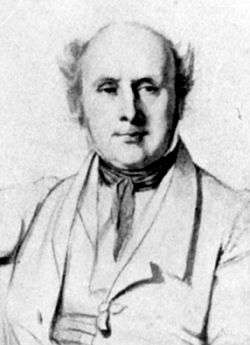Charles Athanase Walckenaer

Baron Charles Athanase Walckenaer (25 December 1771 – 28 April 1852) was a French civil servant and scientist.
Biography
Walckenaer was born in Paris and studied at the universities of Oxford and Glasgow. In 1793 he was appointed head of the military transports in the Pyrenees, after which he pursued technical studies at the École Nationale des Ponts et Chaussées and the École polytechnique. He was elected member of the Institut de France in 1813, was mayor (maire) in the 5th arrondissement in Paris and secretary-general of the prefect of the Seine 1816-1825. He was made a baron in 1823.
In 1839 he was appointed conservator for the Department of Maps at the Royal Library in Paris and in 1840 secretary for life in the Académie des Inscriptions et Belles Lettres. He was one of the founders of the Société entomologique de France in 1832, and a "resident member" of the Société des observateurs de l'homme.
Walckenaer introduced the full biography according to the English model into French literature through his works Histoire de la vie et des ouvrages de la Fontaine (1820, 4th ed. 1858), Histoire de la vie et des poésies d'Horace (1840; new ed. 1858) and Mémoires touchent la vie et les écrits de Mme de Sevigné (6 volumes, 1842–1865). In the works of La Bruyère, which he published in 1845, he returned to the original text.
In the area of geography, he discovered the map of Juan de la Cosa, the oldest extant map that shows the American continent, and published La monde maritime (4 vols., 1818), Histoire générale des voyages (21 vols., 1826–1831) and Géographie ancienne, historique et comparée des Gaules (3 vols., 1839, new ed. 1862). He was also an entomologist and arachnologist who published, among other things, the Histoire naturelle des insectes (4 vols., 1836–1847) together with Paul Gervais. He was also scientist who named the black widow.
External links
- Google Books Digital Version of Apteres Histoire naturelle des insectes
- Works by or about Charles Athanase Walckenaer at Internet Archive
![]() This article contains content from the Owl Edition of Nordisk familjebok, a Swedish encyclopedia published between 1904 and 1926, now in the public domain.
This article contains content from the Owl Edition of Nordisk familjebok, a Swedish encyclopedia published between 1904 and 1926, now in the public domain.